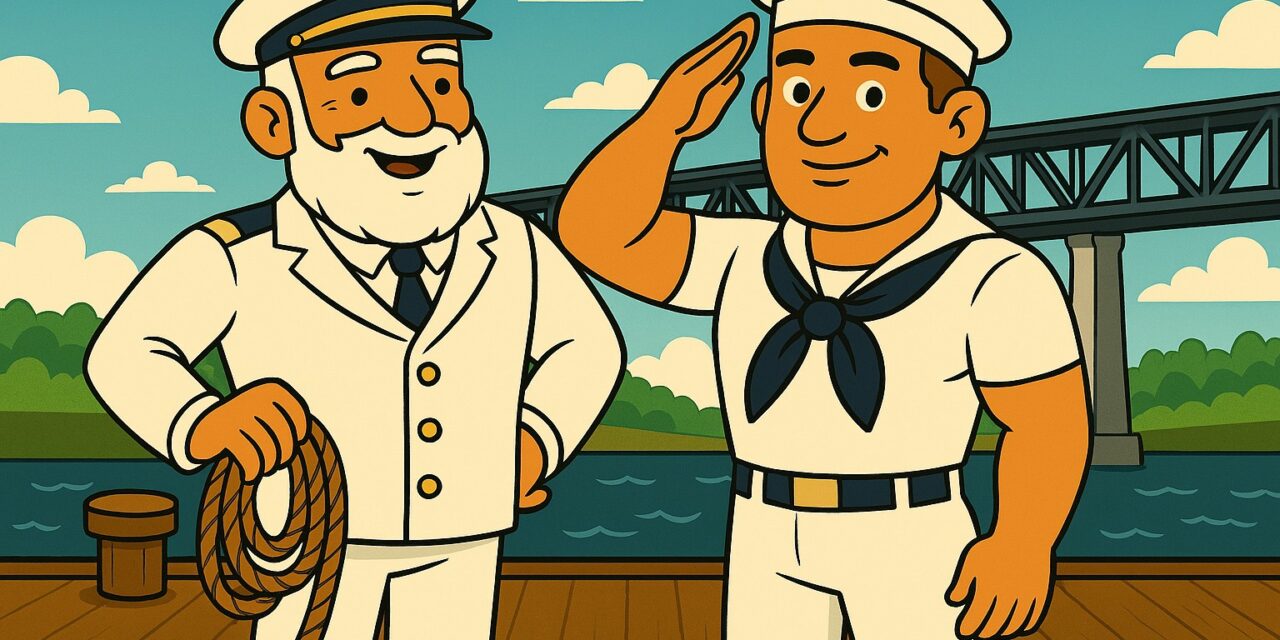Water, water, everywhere!
Review by Daniel Greenways
Written by & Starring: Dave Clarke & John Ullyatt
Directed by: Eileen Sproule
(Real) Runtime: 52 minutes
Spotlight Cabaret (Venue 25)
8217 104 ST NW
August 16-17, 19-24, 2025
★★☆☆☆ 2/5 stars
Summoned to attention by a foghorn over the loudspeakers, the audience at Thursday’s performance of SHIPSHOW! were reminded, almost continually, that the play’s title was to be taken literally. It is, from bow to stern, a show comprised almost entirely of puns about ships.
On paper, it was quite a promising little dingy, especially because of its cast. Dave Clarke and John Ullyatt are mainstays in the Edmonton theatre scene. Ullyatt, in particular, is a legend and household name among comedy-goers in the city, and has featured in countless plays at the Citadel and beyond. The play was even directed by Eileen Sproule, who is much-loved, for decades now, as a director and teacher in the same system. As such, opening night was nearly packed with an audience certain that this dynamic trio would be a masthead for us to cling to in the stormy, uncensored seas of the Fringe. Alas and alack, the waters were not quite as forecasted.
Even before the play began, there were warning signs that this was going to be an exercise in cliché. Ten minutes before the curtain, Clarke’s character Captain Willie was already hovering over various tables saying “ahoy” to everyone that glanced up from their drink orders. The vibe of a dinner theatre was heavy upon the room until the foghorn sounded and our odyssey began. The story’s plot (which only began 15 minutes into the show) follows Willie, the former captain of the Flying Dutchman, who was cursed to be immortal during a storm, some 350 years ago. The only cure to this fate would be a woman willing to kill herself for Willie out of love. Why exactly Willie wants to end his immortality is never really explored, but we can probably assume it’s some kind of All Men are Mortal curse that becomes tiresome after 350 years. Willie is accompanied into eternity by his trusty friend Able Seaman Simon (Ullyatt), who received the same curse by accident and proxy.
However, neither plot nor circumstance are of big importance in this show. No, there are two basic forces driving this ship, and neither of them are the four strong winds nor the seven seas. Instead, the play was driven on the raw cringe energy of puns, and a constant supply of popular music covers. Both the puns and the songs had one condition – they had to connect with the sea. That’s it. This is the real substance of SHIPSHOW! which is more of a medley than anything else. At its core it is a kind of pastiche cabaret filled with “three and a half centuries of f***ing fish puns” as Seaman Simon would put it.
In all fairness, there was quite a bit of laughter throughout, and many smiling faces. Some of the jokes landed safely ashore, and it was obvious that some of the audience found this cabaret pleasant entertainment. Nevertheless, most of the play’s humour was really a wash, bearing all the marks of post-modernity, but tragically none of post-irony.
These faults were magnified by the dinner-theatre vibe, where the venue was really to blame. Despite its glittering art-deco-inspired interior, The Spotlight Cabaret has the unfortunate habit of delivering food orders and bills to the audience during the show. This was actually so distracting that Ullyatt himself broke character at one point, asking what was going on in the front row, only to masterfully pull himself out of this situation by saying something like “I see that money is being exchanged, carry on.”
In addition to this improv, there were a few moments of real honesty in the play that, like this, had the ferocious clarity that Ullyatt is best known for. In particular, Seaman Simon’s song of the siren, his fear of the unknown future, and the duo’s oceanographic ballet, each bore a kind of Hans Teeuwen style detachment that was much needed in this play. One felt that if this tone of raw absurdity was the norm, we could have been in for a real treat.
Alas, it’s an ill wind that blows no good, and this did not happen.




